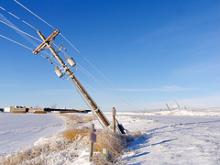Tornado Destroys Homes, Cable Companies Charge Homeowners
When a tornado rips your town apart and destroys your home, should you have to pay extra fees to your cable provider? Of course not. But we continue to see these news stories about massive cable companies ripping off people who are just trying to find the energy to get by day to day.
Last year, we saw reports about Charter Cable telling Alabama tornado victims they had to "find" their cable boxes or pay for them.

According to the friend, Glenda Dillashaw, a Charter representative told her that Spain would need to find his cable box or be charged $212 for its loss.Fortunately, when Spain followed up with Charter after receiving another bill, the representative told him not to worry about it, suggesting that either Charter has an ambiguous policy to deal with it or Spain found a customer support person who's heart had not yet been crushed by soul-numbing job of being a customer support representative for a massive cable company. At least one other company has a formal policy in place for these situations:
Bright House Networks, whose service area includes hard-hit Pratt City, also expects its customers to file claims under homeowners' or renters' insurance to pay for lost or destroyed cable boxes. "That's how we normally handle it," spokesman Robert L. Smith said.Fascinatingly, an article in Michigan claims Comcast does not have a policy in place for these situations. Following recent tornados in Michigan, Comcast customers who lost their homes were given the option of paying a cancellation fee or paying a reduced "vacation" rate for a service they could not use.

Katherine Pfeiffer and Kathy Crawford soon found that residents were being told that they would be responsible for damaged or lost cable boxes and modems. Initially residents were told their accounts with Comcast would be put on “vacation” status, where a monthly fee of between $15 and $20 would be charged.Comcast is supposedly "working on a solution" for these people. The hubris of this massive companies is unreal. People who are waiting to hear if their home is repairable or has to be destroyed should not be confronted by the cable company with exorbitant fees.


